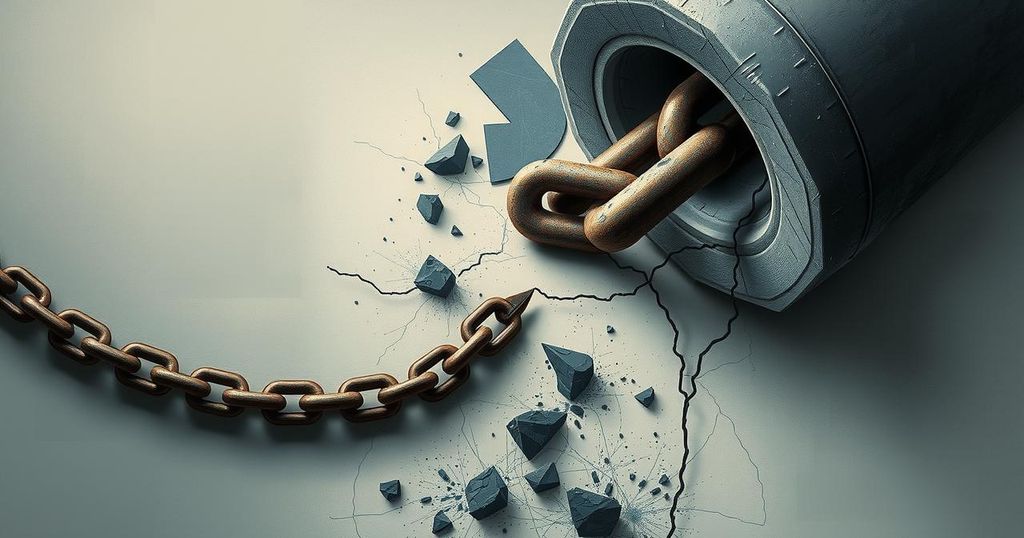Protests Erupt Across Iran Amid Economic Hardship and Political Discontent

On February 11, protests erupted across Iran against economic hardship, unpaid wages, and political executions. Demonstrations took place in various cities, with citizens voicing their frustrations over government mismanagement. Key issues highlighted included inflation, housing crises, and a call for the abolition of the death penalty, signaling a growing wave of civil unrest against the clerical regime’s policies.
On February 11, widespread protests erupted throughout Iran as workers, nurses, and defrauded homebuyers expressed their discontent with economic mismanagement and government policies. Demonstrations were documented in cities such as Tehran, Bushehr, Qazvin, and Gilan, where citizens rallied against soaring inflation, unpaid salaries, and increasing executions.
In the city of Dehdasht, protesters attempted to overtake Police Station No. 12, reflecting heightened public frustration. Demonstrators gathered in the central gold market square, vocally opposing government oppression and advocating for national unity. Social media amplified calls for solidarity with the message, “Don’t leave Dehdasht alone!”
In Tehran, nurses from Rasoul Akram Hospital rallied against deteriorating working conditions and unpaid wages with chants proclaiming, “Empty promises are enough, our tables are empty!” This protest occurred against the backdrop of a healthcare sector suffering from neglect and increasing challenges.
Families of death row prisoners and civil rights advocates congregated outside Evin Prison, seeking a cessation to political executions. Signs that read “No to executions!” and “Unite to abolish the death penalty!” highlighted the urgency of their demands. This rally coincided with the 55th week of the ongoing ‘No to Executions Tuesdays’ campaign, rallying against Iran’s capital punishment practices.
Contract workers at Bushehr’s Fajr Jam Gas Refinery participated in protests, echoing sentiments of dissatisfaction by chanting, “Enough with promises, our tables are empty!” The gas and oil industry, once integral to Iran’s economy, has suffered significantly from mismanagement and economic sanctions, leading to widespread labor unrest.
In Qazvin, individuals affected by the National Housing Plan protested at the governor’s office due to the government’s failure to deliver promised housing. Their slogans, “Protest is our undeniable right!” and “Worker, raise your voice, demand your rights!” reflected the deep-seated frustrations exacerbated by corruption and inflation.
Workers at the Foolad Khazar Steel Plant in Gilan went on strike over unpaid salaries and job insecurity, mirroring the growing labor activism nationally as inflation diminished their purchasing power. In Khash, security forces conducted violent actions against neighborhood residents, resulting in the arrest of a local father. This action illustrates the ongoing tensions in Baluch-majority regions amid heightened repression.
Furthermore, unsettling reports from Chabahar detailed aggressive raids by security forces that demolished homes without preemptive warning or legal justification. These actions have incited further public outrage in the wake of the government’s continued negligence.
The Iranian economy is in dire straits, with the national currency plummeting, a precipitous drop in the stock market, and the vast majority of listed companies experiencing losses. Public discontent is rapidly escalating, highlighting a profound dissatisfaction with the clerical regime’s governance and its effects on everyday life.
In summary, the protests manifest a collective frustration of the Iranian populace against economic hardships, systemic corruption, and human rights violations. As workers, families of political prisoners, and healthcare professionals unite under a common cause, their actions signify deep dissatisfaction with the nation’s leadership and policies. The ongoing unrest may potentially serve as a catalyst for change within Iran’s socio-political landscape.
Original Source: www.ncr-iran.org







